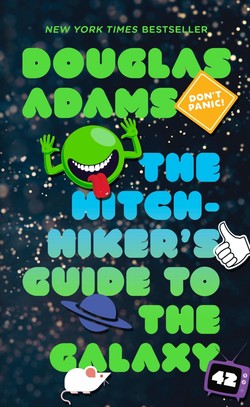
It has been 42 years since the novel The Hitchhiker’s Guide to the Galaxy (HG2G), by Douglas Adams, was published. Since then, we have found ourselves in a world where ebooks, annoyingly friendly robots, and AI surpassing human intelligence (all mentioned in HG2G) don’t seem like the products of a distant future anymore. Like many made-up inventions, these items have crossed from the realm of science fiction into reality. Yet the novel feels all but dated, with the zany adventures of the main characters drawing you in from page one.
As the title suggests, this is a story of hitchhikers traveling across the boundless universe. Characters, species, and planets are discarded almost as quickly as they are thrown at the reader. Yet Adams keeps these adventures grounded with the presence of Arthur Dent, a normal human being and the quasi-main character of the series. He is one of the two last remaining humans alive, owing to a (sort-of) fluke that ends up decimating the Earth. Set off into the galaxy unwillingly, Arthur Dent grapples with the demise of his home planet, the actual existence of aliens, and the realization that he was part of an organic computer. Alongside him are Ford Prefect (an alien who was stuck on Earth for 15 years), Marvin (a robot with real people personality), Zaphod Beeblebrox (president of the galaxy), and Trillian (the other remaining human alive and an astrophysicist).
HG2G is a series that doesn’t take itself too seriously. Douglas Adams’ absurdist humor shines as he whips together aliens and humans and alcoholic beverages into a delightful concoction. Adams has a distinct talent for poking fun at human society, managing it in a world where only two humans remain alive. While Adams’ absurdist humor comes off as slightly depressing at points (especially in the fifth installment of the series), it generally retains a faint optimism that turns away from being truly morose. Like Ford Prefect, who seems to love humans as much as he looks down on them, Adams’ galaxy is both majestic and lacking in simple decencies, like a decent cup of tea. All in all, reading Adams’ humor makes you appreciate life as well as hate it. Yet it feels odd to complain about life when reading this novel. First, a depressed robot tells you to shut up when you do. Second, Arthur Dent has found himself without his planet for the first time in his life, so you can’t really compare.
Aptly, much like hitchhiking, HG2G doesn’t seem to have much structure. Expect to feel completely overwhelmed (not unlike Arthur Dent) for much of the plot. For one, there is rarely a clear evil to be defeated in the world of Adams, though much of it warrants criticism. Even the Vogons, who are probably the closest we get to an antagonist, are simply bullheaded bureaucrats who would let their grandmother die rather than ignore protocol. (Vogons also happen to kill inhabited planets for money.) Adams manages to tie together many seemingly random plot points in the final parts of the books, like a magician revealing his tricks. Still, the endless introduction of yet another seemingly random event can get tiring, at least until everything ties together neatly at the end.
Despite being a product of an earlier time, Adams’ insights about technology feel incredibly prescient even today. Programmed with “genuine people personalities”, computers in Adams’ future are cursed with annoying friendliness or crippling depression. A radio controlled by motion-sensors proves impossible to operate, as listening to the same station requires users to play mannequin.
Extremely popular when it was published, HG2G still has many loyal fans today. Originally a radio series, it was reproduced in book, movie, and TV versions, so it might seem like HG2G has nowhere else to go. But the world of movie adaptations, remakes, and sequels are as limitless as the universe. There are no plans for HG2G now, but there’s no telling what will happen in the future.
Not being a fan of science fiction, I was surprised to find this series as enjoyable as I did. Perhaps there is something comforting about the idea that life forms exist outside of Earth. Or perhaps it’s the idea that life isn’t really supposed to make sense. Or maybe six times seven is simply forty-two. I don’t know. The long-lasting popularity of The Hitchhiker’s Guide to the Galaxy may be as elusive as the answer to life, the universe, and everything — but it is certainly no accident.

